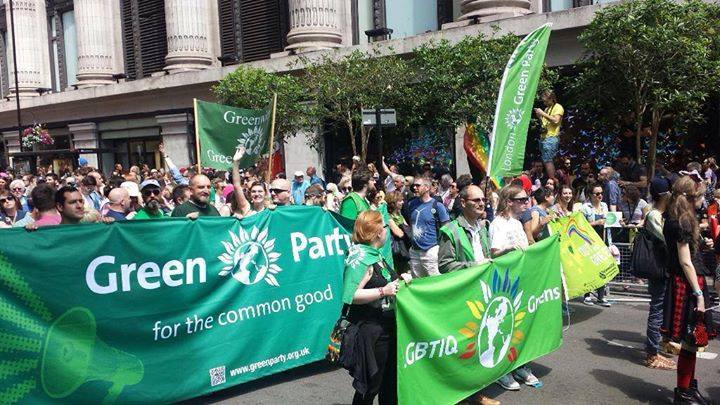All liberation struggles are important – why the Green Party must embrace intersectionality

CW: Discussion of discrimination including transphobia
It is an argument frequently made within the Green Party that we should focus far less on social issues and return to our Ecology Party roots. Supporters of this quite rightly point out that social problems are quite irrelevant if the planet will not survive to see any improvement. I myself agree that saving the environment should be the backbone of our society.
But, herein lies the problem:
Without focus on solving social issues, we cannot effectively organise both within the party and wider society to address the impending death of planet Earth. Moreover, social inequalities are ingrained in a system controlled by the privileged few – the system that works by exploiting both the environment and the people. To combat social injustice and ecological issues goes hand in hand.
At the risk of using a capitalist metaphor, consider that the Green Party is a company.
Each of us within it are working towards the success of the company in some way; some of us are simply working to improve things in their department or branch – at a local level – and some of us try to help the company on a national level. Each member of the party is part of the workforce.
However, for the workforce to operate at maximum efficiency, morale must be kept high. This is why we as a party must focus on intersectionality in order to make positive change on issues environmental or otherwise; if one group of staff feel that they are not being listened to or appreciated then they will begin to reduce their contribution to or even work against the company.
But further than this: each group of staff should be able to feel accepted and receive equal treatment to others regardless of the benefit to the company.
Freedom from discrimination is a human right, and to suggest that environmental issues are more important derails an important discussion. As a party we are able to champion more than one issue, and the idea that intersectionality is unimportant – an idea that I have seen more times than I could have ever expected – is quite frankly ridiculous.
The only group that I have personally seen making admirable progress with inclusion have been the Young Greens.
I recently attended the Young Greens convention in Nottingham. Though I stood for election to the Young Greens SPC, I had had limited involvement with the group previously and this would be my first event. I was pleasantly surprised at what I encountered right from the start of the event.
Included in my welcome pack was a copy of the Safe Space policy – a document that, essentially, forbids bullying in all Green spaces, with particular focus on discrimination. This gentle reminder that such things were not tolerated was a simple way of holding people accountable for their actions, making everyone aware what constitutes as bullying and hopefully encouraging them to think twice. On top of this, as everyone gathered in the main lecture theatre, labels were distributed for everybody to put their names and pronouns on. I particularly liked the focus on pronouns as I think it is important to normalise pronouns within introductions; this way, trans and non-binary folk do not feel awkward or “needy” when specifying what pronouns they use, and those who may be scared to ask or ascertain pronouns can avoid misgendering people. The specification of pronouns carried right through to the meetings of liberation groups and sometimes the speakers on the floor at the AGM. Such practices would have been useful at Conference, where several trans people were repeatedly (and often deliberately, under the guise of ignorance) misgendered.
The first workshop of the day was on intersectionality, and was the only workshop scheduled to encourage maximum attendance. Led by the Young Greens Equality and Diversity officer Sophie (now co-chair), the session encouraged those present to recognise their privileges and the intersections of disadvantaged groups in society – an example would be acknowledging that though women and non-binary people are oppressed, a woman of colour faces increased discrimination. Even those of us who felt they were experts on the topic were affected positively; at the LGBTIQA caucus we had a discussion on how we could better help POC within our own community.
On the topic of liberation groups, I feel that the Young Greens far greater see the importance of recognising and enabling such groups so that those who face regular and systematic oppression can organise and have a voice. Unlike at Conference, each liberation group at YG Convention had its own closed room so important conversations could be had without interruption. Not only that, but a motion was passed at the AGM officially recognising liberation groups in the constitution – something that the whole party would do well to adopt to make certain that oppressed groups have a voice within the party.
I came home from convention feeling more a part of the party than I ever had before, and I strongly believe that this was because at no point during the weekend did I feel unsafe, did I feel unheard, did I feel anything but acceptance. I feel far more enthusiastic about being involved in party campaigns than I had before, and I can only imagine what a difference would be made if everyone who tried to campaign for their own rights and issues was welcomed and not told that their struggles are unimportant.
While the Young Greens are by no means perfect, they are recognising and addressing problems in a way that I think the whole party should follow.




I have to say, I find a lot of the language in this article confusing, and – to be honest – a little bit alienating. I have no idea what the term “intersectionality” means (it’s clearly an academic term of some kind, but that’s as far as I get without going away to look it up), and have only a vague idea of what counts as a “liberation group”.
Is there any chance that those advocating putting these things front and centre could describe them using language that is easier to understand, and easier to communicate to the general public.
Interesting article, personally didn’t really get the company analogy, as it failed to really explain why intersectionality would increase morale of members of the party. I would love to see the Young Greens take safe space and bullying issues more seriously and actually protect vulnerable members, rather than protect those with privilege, power and positions within the greater party and brushing complaints under the carpet.
Great article, though to an extent I feel that the national party is already doing a pretty good job of moving in this direction (aided hugely by the Young Greens), but we can definitely do more to push these issues up the agenda.
Something I’d have liked this article (and similar articles) to cover is the action we take (or don’t take) when members don’t support intersectionality or liberation groups, but do still support our economic and ecological policies.
At Young Greens Convention one of the former co-chairs said division in the party wasn’t an issue of young and old but “An issue of those who think intersectionality is important and those who don’t.” He then added: “and frankly they can either learn or get out.”
While meant with the best of intentions, that kind of statement is, I think, actually more damaging than helpful. There will always be members who join the Greens because we are environmentally Green, not because of our approach to intersectionality. Expelling them from the party, or completely quashing their voices just because they disagree with us, goes against our fundamental principle of maintaining a democratic political party. I think we need to find a way to bridge that gap while accepting that some people are completely unmovable on certain subjects. We can win our battles on liberation issues without them, and we are doing so, while retaining their membership for causes where we share common interests like environmentalism and economic leftism. Something definitely needs to be done to bridge that gap or our party will have soon have in-fighting as bad as the Parliamentary Labour Party, and I’d be interested to see if people can come up with a way that doesn’t result in booting people out.